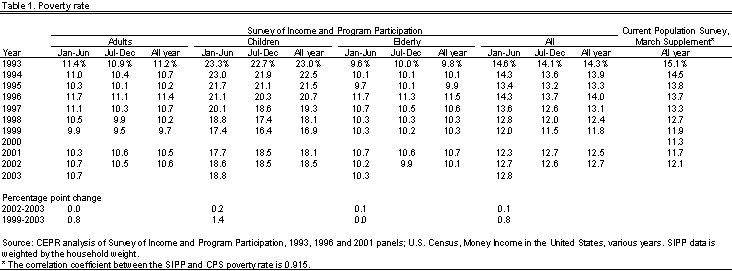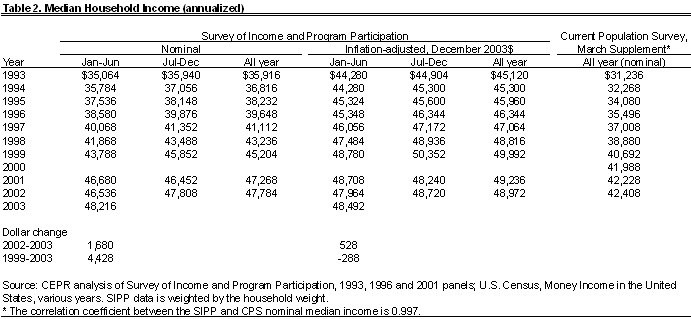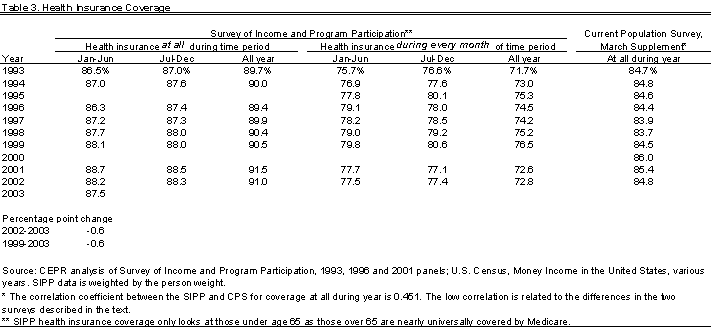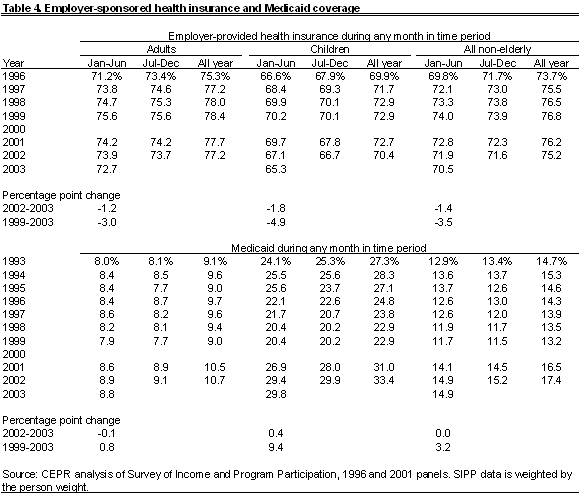http://news.yahoo.com/news?tmpl=story&u=/nm/20040819/pl_nm/economy_poverty_dc_1U.S. Poverty Likely Rose in 2003, Income Gap Wider
WASHINGTON (Reuters) - More Americans likely slid into poverty in 2003 and the gap between the rich and poor widened, economists said on Thursday in a report that could fuel Democrat criticism of President Bush.
While the nation's official poverty rate will not be released until next week, the left-leaning Center for Economic and Policy Research estimated 700,000 Americans were added to the ranks of the poor last year, based on early numbers.
That takes the number of poor in the United States to about 36.4 million, from 35.7 million in 2002.
http://www.cepr.net/Events/poverty_briefing.htmThursday, August 19, 2004
On August 26, the U.S. Census will release new numbers on poverty, income, and health insurance coverage for 2003. This data will come from the Current Population Survey's Annual Demographic Supplement, conducted in March 2004. The Census will also release data from the 2003 American Community Survey.
CEPR is previewing this data on August 19 by presenting analysis on poverty, income, and health insurance coverage from the Survey of Income and Program Participation (SIPP), another Census data product, for the first six months of 2003.
The SIPP data closely correlates with the Current Population Survey (CPS) on poverty and income. Given the broader U.S. labor market trends of stalled job growth and periods of wage decline during 2003, all of the signs point to falling income and rising poverty.
We expect the 2003 data to show that poverty has risen or remained steady, income has fallen or is steady, and that health insurance coverage has fallen. Any policy measures taken to improve this picture must focus on boosting employment, increasing wages, and expanding health care coverage. Doing without health insurance for any part of the year is a great financial hardship on individual or family -- an unexpected illness can lead to health costs spiralling out of control just when a family is least able to afford it.
See Heather Boushey's memo.
http://www.cepr.net/publications/poverty.htmAnalysis of the Upcoming Release of 2003 Data on Income, Poverty, and Health Insurance
Heather Boushey1
August 19, 2004
On August 26, the U.S. Census Bureau will release data on poverty, income, and health insurance coverage for 2003. This data will come from the Current Population Survey's Annual Demographic Supplement, conducted in March of 2004 (March CPS).
This data release provides a scorecard of how well the labor market performed in 2003. Changes in household income and poverty rates are directly related to the performance of the labor market because wages and salaries comprise about three-quarters of total family income. Health insurance is also directly tied to employment as most Americans-three-in-five-get their health insurance from an employer.
We expect that none of these three indicators will show substantial improvement-if any-for 2003 because of the lackluster labor market. Preliminary analysis shows that for the first half of 2003 compared to the first half of 2002, inflation-adjusted income is up minimally, poverty increased, and health insurance coverage fell. Given that weekly earnings continued to fall in the latter half of 2003, it is likely that household income will fall for the fourth year in a row or, at most, increase only slightly, and that poverty will rise for the third year in a row.
Health insurance coverage fell in 2001 and 2002 and we expect it to fall again in 2003. Lower employment levels mean fewer people have access to employer-provided health insurance from their own employer. Further, people are increasingly less likely to receive health insurance as a dependent on another family member's employer-provided plan. While Medicaid coverage has risen, it will not be sufficient to offset declining employer-based coverage.
Labor market performance in 2003
Although the most recent recession had been officially over for more than a year at the beginning of 2003, the labor market had not yet recovered. Millions remained out of work and wage growth slowed to a crawl.
Over 2003, 61,000 jobs were lost, fewer than in 2002 (563,000 jobs lost) or 2001 (1,782,000 jobs lost). Job growth did begin to turn positive in 2003, however, as the economy showed an increased of 221,000 jobs between July and December.
Unemployment averaged over six percent for the year and did not dip below six percent until November 2003. The unemployment rate hit a high of 6.3 percent in June 2003, a level not seen since 1994. However, a more telling measure of overall labor market performance is the employment-to-population ratio, the share of Americans who have a job. In 2000, this ratio averaged 64.4 for the year; in 2003, the employment-to-population ratio, at 62.3, was a full 2.1 percentage points lower.
Typically, the rate of wage growth falls after the unemployment rate rises, and this has been true during the most recent economic recession. Over 2003, average inflation-adjusted weekly earnings were flat. This stands in contrast to 2002 when inflation-adjusted weekly earnings grew by 1.3 percent. Looking over 2003, hourly wages fell in the winter and summer of 2003, and then began a steady decline since November 2003.
Overall, this economic recovery has seen a low level of job creation. Today, the economy still has 1.2 million fewer jobs than we had at the beginning of the recession in March 2001. Tepid job growth translates into declining economic well-being for America's families.<snip>
Fundamentally, however, it is the cost of health insurance that is the problem. The costs of health insurance coverage continue to rise far faster than the pace of inflation. According to a Kaiser/HRET Survey, in 2003, health insurance premiums rose by 13.9 percent. Slowing the growth in health insurance costs would help to increase access to health insurance.




Congressional Budget Office. 2004. Effective Federal Tax Rates Under Current Law, 2001 to 2014; Joint Economic Committee Democrats, 2004. New CBO Analysis Confirms that the Bush Tax Cuts are Skewed Toward The Rich.